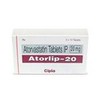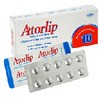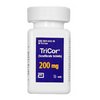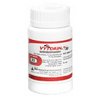INDICATIONS
Tricor is used for controlling high cholesterol and triglyceride levels in the blood. It is used in combination with a diet that is low in cholesterol and saturated fat. Tricor is a lipid-lowering agent. It works by lowering elevated blood triglyceride levels by making the liver produce fewer triglycerides and increasing the elimination of triglycerides from the blood stream.
INSTRUCTIONS
Use Tricor as directed by your doctor.
- Take Tricor by mouth with or without food.
- Swallow Tricor whole. Do not break, crush, or chew before swallowing. Do not take chipped or broken tablets.
- Take Tricor with a full glass of water (8 oz/240 mL).
- If you also take a bile acid-binding resin (eg, cholestyramine), do not take it within 4 to 6 hours before or 1 hour after taking Tricor. Check with your doctor if you have any questions.
- Take Tricor on a regular schedule to get the most benefit from it.
- If you miss a dose of Tricor, take it as soon as possible. If it is almost time for your next dose, skip the missed dose and go back to your regular dosing schedule. Do not take 2 doses at once.
Ask your health care provider any questions you may have about how to use Tricor.
STORAGE
Store Tricor between 68 and 77 degrees F (20 and 25 degrees C) in a moisture-protective container. Brief storage at temperatures between 59 and 86 degrees F (15 and 30 degrees C) is permitted. Store away from heat, moisture, and light. Do not store in the bathroom. Keep Tricor out of the reach of children and away from pets.
MORE INFO:
Active Ingredient: Fenofibrate.
Do NOT use Tricor if:
- you are allergic to any ingredient in Tricor
- you have gallbladder problems, liver problems (including cirrhosis, hepatitis), or severe kidney problems (eg, kidney failure)
- you are breast-feeding or pregnant.
Contact your doctor or health care provider right away if any of these apply to you.
Some medical conditions may interact with Tricor. Tell your doctor or pharmacist if you have any medical conditions, especially if any of the following apply to you:
- if you are pregnant, planning to become pregnant, or are breast-feeding
- if you are taking any prescription or nonprescription medicine, herbal preparation, or dietary supplement
- if you have allergies to medicines, foods, or other substances
- if you have diabetes, an underactive thyroid, heart blood vessel problems, gallstones, kidney problems, or certain muscle problems (myopathy)
- if you have a history of pancreatitis or blood clots in your veins (deep vein thrombosis or pulmonary embolism)
- if you are very overweight, have an inactive lifestyle, or you drink large amounts of alcohol
- if you are taking a beta-blocker (eg, propranolol), estrogen, or thiazide diuretic (eg, hydrochlorothiazide).
Some medicines may interact with Tricor. Tell your health care provider if you are taking any other medicines, especially any of the following:
- HMG-CoA reductase inhibitors (eg, simvastatin) because the risk of serious muscle problems leading to kidney failure may be increased
- Immunosuppressants (eg, cyclosporine) or other medicines that may harm the kidney (eg, aminoglycoside antibiotics [eg, gentamicin], amphotericin B, nonsteroidal anti-inflammatory drugs [NSAIDs] [eg, ibuprofen], tacrolimus, vancomycin) because they may decrease Tricor's excretion and increase the risk of its side effects
- Anticoagulants (eg, warfarin) or sulfonylureas (eg, glipizide) because the risk of their side effects may be increased by Tricor.
This may not be a complete list of all interactions that may occur. Ask your health care provider if Tricor may interact with other medicines that you take. Check with your health care provider before you start, stop, or change the dose of any medicine.
Important safety information:
- Tricor may cause dizziness or lightheadedness. These effects may be worse if you take it with alcohol or certain medicines. Use Tricor with caution. Do not drive or perform other possible unsafe tasks until you know how you react to it.
- Avoid drinking alcohol while you are using Tricor.
- Do NOT take more than the recommended dose without checking with your doctor.
- Follow the diet, exercise, and weight reduction program given to you by your health care provider.
- Report any unexplained muscle pain, tenderness, or weakness to your doctor right away, especially if you also have a fever or general body discomfort.
- Lab tests, including liver function, kidney function, blood cholesterol, and other blood tests, may be performed while you use Tricor. These tests may be used to monitor your condition or check for side effects. Be sure to keep all doctor and lab appointments.
- Use Tricor with caution in the elderly; they may be more sensitive to its effects.
- Tricor should be used with extreme caution in children; safety and effectiveness in children have not been confirmed.
- Pregnancy and breast-feeding: If you plan on becoming pregnant, contact your doctor. You will need to discuss the benefits and risks of using Tricor while you are pregnant. It is not known if Tricor is found in breast milk. Do not breastfeed while taking Tricor.
All medicines may cause side effects, but many people have no, or minor, side effects.
Check with your doctor if any of these most common side effects persist or become bothersome:
Headache; nausea.
Seek medical attention right away if any of these severe side effects occur:
Severe allergic reactions (rash; hives; itching; difficulty breathing; tightness in the chest; swelling of the mouth, face, lips, or tongue); calf pain; chest pain; confusion; dark urine; fast, slow, or irregular heartbeat; fever, chills, or persistent sore throat; increased coughing or coughing up blood; muscle pain, tenderness, or weakness (with or without fever and fatigue); pale stools; red, swollen, blistered, or peeling skin; severe or persistent dizziness or lightheadedness; severe or persistent nausea, stomach pain, or vomiting; severe pain or swelling in the ankles, feet, or legs; shortness of breath; unusual bruising or bleeding; yellowing of the skin or eyes.
This is not a complete list of all side effects that may occur. If you have questions about side effects, contact your health care provider.
 Atorlip-20Atorlip-20 is used to treat high cholesterol.as low as $2.22
Atorlip-20Atorlip-20 is used to treat high cholesterol.as low as $2.22 Atorlip-5Atorlip-5 is used to treat high cholesterol.as low as $0.5
Atorlip-5Atorlip-5 is used to treat high cholesterol.as low as $0.5 ZetiaZetia is used for treating high blood cholesterol along with a low-fat, low-cholesterol diet.as low as $1.24
ZetiaZetia is used for treating high blood cholesterol along with a low-fat, low-cholesterol diet.as low as $1.24 TricorTricor is used for controlling high cholesterol and triglyceride levels in the blood.as low as $0.82
TricorTricor is used for controlling high cholesterol and triglyceride levels in the blood.as low as $0.82 CrestorCrestor is used for lowering high cholesterol and triglycerides in certain patients.as low as $0.72
CrestorCrestor is used for lowering high cholesterol and triglycerides in certain patients.as low as $0.72 VytorinVytorin is used for treating high cholesterol along with a cholesterol-lowering diet.as low as $1.04
VytorinVytorin is used for treating high cholesterol along with a cholesterol-lowering diet.as low as $1.04